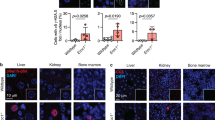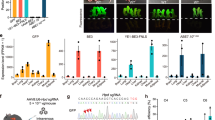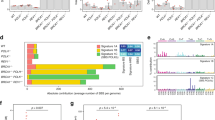Abstract
O6-methylguanine methyltransferase, Mgmt, constitutes the first line of defense against O6-alkylguanine, which can result in G : C to A : T transitions upon DNA replication. Mgmt has been found in organisms as diverse as archaebacteria and mammals. This evolutionary conservation suggests that all organisms may be exposed to either endogenous or environmental alkylating agents. We thus hypothesized that tissues of Mgmt−/− mice would exhibit elevated mutant frequencies. Employing the Big Blue™ transgenic system, we evaluated lacI mutants rescued from liver and small intestinal DNA of young Mgmt−/− mice. Interestingly, while there was a small difference between Mgmt−/− mice and controls with respect to lacI mutant frequency, no differences attributable to Mgmt deficiency were apparent in the mutational spectra. Although mutations stemming from O6-guanine alkylations would be predicted to be cumulative, we found no evidence of an Mgmt-dependent alteration in mutation spectrum in DNA samples from 12 month-old mice. To optimize our ability to detect mutations resulting from O6-alkylguanine-induced G : T mismatches, mice with combined deficiencies of Mgmt and the DNA mismatch repair molecule, Msh6, were analysed. In spite of this strategy, we observed no significant differences between Mgmt−/− Msh6−/− and Msh6−/− mouse lacI mutations, except for a trend towards a greater percentage (of total transitions) of G : C to A : T changes in Mgmt−/−Msh6−/− livers. Therefore, despite the striking evolutionary conservation of Mgmt, deficiency of this gene did not significantly impact the spontaneous lacI mutational spectrum in vivo.
This is a preview of subscription content, access via your institution
Access options
Subscribe to this journal
Receive 50 print issues and online access
$259.00 per year
only $5.18 per issue
Buy this article
- Purchase on Springer Link
- Instant access to full article PDF
Prices may be subject to local taxes which are calculated during checkout
Similar content being viewed by others
Abbreviations
- IDLs:
-
insertion/deletion loops
- MCA:
-
Monte Carlo analysis
- Mf:
-
mutant frequency
- Mgmt:
-
O6-methylguanine-DNA methyltransferase
- MMR:
-
mismatch repair
- MSH:
-
MutS homolog
References
Adams WT and Skopek TR . (1987). J. Mol. Biol., 194, 391–396.
Allay E, Reese JS, McGuire EA, Koc ON, Sedransk N and Gerson SL . (1997). Oncogene, 15, 2127–2132.
Allay E, Veigl M and Gerson SL . (1999). Oncogene, 18, 3783–3787.
Andrew SE, McKinnon M, Cheng BS, Francis A, Penney J, Reitmair AH, Mak TW and Jirik FR . (1998). Proc. Natl. Acad. Sci. USA, 95, 1126–1130.
Andrew SE, Pownall S, Fox J, Hsiao L, Hambleton J, Penney JE, Kohler SW and Jirik FR . (1996). Mutat. Res., 357, 57–66.
Andrew SE, Reitmair AH, Fox J, Hsiao L, Francis A, McKinnon M, Mak TW and Jirik FR . (1997). Oncogene, 15, 123–129.
Andrew SE, Xu XS, Baross-Francis A, Narayanan L, Milhausen K, Liskay RM, Jirik FR and Glazer PM . (2000). Carcinogenesis, 21, 1291–1295.
Arrault X, Michel V, Quillardet P, Hofnung M and Touati E . (2002). Mutagenesis, 17, 353–359.
Baross-Francis A, Makhani N, Liskay RM and Jirik FR . (2001). Oncogene, 20, 619–625.
Bawa S and Xiao W . (1999). Mutat. Res., 430, 99–107.
Benjamin N . (2000). Ann. Zootech., 49, 207–216.
Bignami M, O'Driscoll M, Aquilina G and Karran P . (2000). Mutat. Res., 462, 71–82.
Cariello NF, Douglas GR, Dycaico MJ, Gorelick NJ, Provost GS and Soussi T . (1997). Nucleic Acids Res., 25, 136–137.
Cariello NF and Gorelick NJ . (1996). Environ. Mol. Mutagen., 28, 397–404.
Chung FL, Chen HJ and Nath RG . (1996). Carcinogenesis, 17, 2105–2111.
Corpet F . (1988). Nucleic. Acids. Res., 16, 10881–10890.
de Boer JG, Provost S, Gorelick N, Tindall K and Glickman BW . (1998). Mutagenesis, 13, 109–114.
Dycaico MJ, Provost GS, Kretz PL, Ransom SL, Moores JC and Short JM . (1994). Mutat. Res., 307, 461–478.
Edelmann W, Yang K, Umar A, Heyer J, Lau K, Fan K, Liedtke W, Cohen PE, Kane MF, Lipford JR, Yu N, Crouse GF, Pollard JW, Kunkel T, Lipkin M, Kolodner R and Kucherlapati R . (1997). Cell, 91, 467–477.
Espey MG, Miranda KM, Thomas DD, Xavier S, Citrin D, Vitek MP and Wink DA . (2002). Ann. N.Y. Acad. Sci., 962, 195–206.
Georgiadis P, Samoli E, Kaila S, Katsouyanni K and Kyrtopoulos SA . (2000). Cancer Epidemiol. Biomarkers Prev., 9, 299–305.
Gerson SL . (2002). J. Clin. Oncol., 20, 2388–2399.
Gerson SL, Trey JE, Miller K and Berger NA . (1986). Carcinogenesis, 7, 745–749.
Glassner BJ, Weeda G, Allan JM, Broekhof JL, Carls NH, Donker I, Engelward BP, Hampson RJ, Hersmus R, Hickman MJ, Roth RB, Warren HB, Wu MM, Hoeijmakers JH and Samson LD . (1999). Mutagenesis, 14, 339–347.
Hickman MJ and Samson LD . (1999). Proc. Natl. Acad. Sci. USA, 96, 10764–10769.
Hill KA, Buettner VL, Halangoda A, Kunishige M, Moore SR, Longmate J, Scaringe WA and Sommer SS . (2004). Environ. Mol. Mutagen, 43, 110–120.
Hogg N, Darley-Usmar VM, Wilson MT and Moncada S . (1993). FEBS Lett., 326, 199–203.
Ishikawa T, Ide F, Qin X, Zhang S, Takahashi Y, Sekiguchi M, Tanaka K and Nakatsuru Y . (2001). Mutat. Res., 477, 41–49.
Iwakuma T, Sakumi K, Nakatsuru Y, Kawate H, Igarashi H, Shiraishi A, Tsuzuki T, Ishikawa T and Sekiguchi M . (1997). Carcinogenesis, 18, 1631–1635.
Jansen M, Bardenheuer W, Sorg UR, Seeber S, Flasshove M and Moritz T . (2001). Eur. J. Haematol., 67, 2–13.
Janssen K, Eichhorn-Grombacher U, Schlink K, Nitzsche S, Oesch F and Kaina B . (2001). Arch. Toxicol., 75, 306–312.
Jiricny J and Nystrom-Lahti M . (2000). Curr. Opin. Genet. Dev., 10, 157–161.
Kaina B, Ochs K, Grosch S, Fritz G, Lips J, Tomicic M, Dunkern T and Christmann M . (2001). Prog. Nucleic. Acid. Res. Mol. Biol., 68, 41–54.
Kawate H, Itoh R, Sakumi K, Nakabeppu Y, Tsuzuki T, Ide F, Ishikawa T, Noda T, Nawata H and Sekiguchi M . (2000). Carcinogenesis, 21, 301–305.
Kawate H, Sakumi K, Tsuzuki T, Nakatsuru Y, Ishikawa T, Takahashi S, Takano H, Noda T and Sekiguchi M . (1998). Proc. Natl. Acad. Sci. USA, 95, 5116–5120.
Klein JC, Bleeker MJ, Lutgerink JT, van Dijk WJ, Brugghe HF, van den Elst H, van der Marel GA, van Boom JH, Westra JG, Berns AJM and Kriek E . (1990). Nucleic. Acids. Res., 18, 4131–4137.
Lindahl T . (1993). Nature, 362, 709–715.
Mackay WJ, Han S and Samson LD . (1994). J. Bacteriol., 176, 3224–3230.
Major GN and Collier JD . (1998). J. Hepatobiliary Pancreat Surg., 5, 355–366.
Mark SC, Sandercock LE, Luchman HA, Baross A, Edelmann W and Jirik FR . (2002). Oncogene, 21, 7126–7130.
Marnett LJ . (2000). Carcinogenesis, 21, 361–370.
Minnick DT, Gerson SL, Dumenco LL, Veigl ML and Sedwick WD . (1993). Cancer Res., 53, 997–1003.
Mirsalis JC, Provost GS, Matthews CD, Hamner RT, Schindler JE, O'Loughlin KG, MacGregor JT and Short JM . (1993). Mutagenesis, 8, 265–271.
Mostafa MH, Sheweita SA and O'Connor PJ . (1999). Clin. Microbiol. Rev., 12, 97–111.
Mukai T and Sekiguchi M . (2002). Oncogene, 21, 9033–9042.
Nair J, Barbin A, Velic I and Bartsch H . (1999). Mutat. Res., 424, 59–69.
Nair J, Carmichael PL, Fernando RC, Phillips DH, Strain AJ and Bartsch H . (1998a). Cancer Epidemiol. Biomarkers Prev., 7, 435–440.
Nair J, Gal A, Tamir S, Tannenbaum SR, Wogan GN and Bartsch H . (1998b). Carcinogenesis, 19, 2081–2084.
Nakatsuru Y, Matsukuma S, Nemoto N, Sugano H, Sekiguchi M and Ishikawa T . (1993). Proc. Natl. Acad. Sci. USA, 90, 6468–6472.
Narayanan L, Fritzell JA, Baker SM, Liskay RM and Glazer PM . (1997). Proc. Natl. Acad. Sci. USA, 94, 3122–3127.
Pauly GT and Moschel RC . (2001). Chem. Res. Toxicol., 14, 894–900.
Pegg AE . (2000). Mutat. Res., 462, 83–100.
Posnick LM and Samson LD . (1999). J. Bacteriol., 181, 6756–6762.
Provost GS, Kretz PL, Hamner RT, Matthews CD, Rogers BJ, Lundberg KS, Dycaico MJ and Short JM . (1993). Mutat. Res., 288, 133–149.
Quillardet P, Michel V, Arrault X, Hofnung M and Touati E . (2000). Mutat. Res., 470, 177–188.
Radi R, Beckman JS, Bush KM and Freeman BA . (1991). Arch. Biochem. Biophys., 288, 481–487.
Rebeck GW and Samson L . (1991). J. Bacteriol., 173, 2068–2076.
Reese JS, Allay E and Gerson SL . (2001). Oncogene, 20, 5258–5263.
Rogozin I, Kondrashov F and Glazko G . (2001). Hum. Mutat., 17, 83–102.
Roth RB and Samson LD . (2000). Mutat. Res., 462, 107–120.
Sakumi K, Shiraishi A, Shimizu S, Tsuzuki T, Ishikawa T and Sekiguchi M . (1997). Cancer Res., 57, 2415–2418.
Sedgwick B . (1997). Carcinogenesis, 18, 1561–1567.
Singer B and Hang B . (1997). Chem. Res. Toxicol., 10, 713–732.
Stuart GR, Oda Y, de Boer JG and Glickman BW . (2000). Genetics, 154, 1291–1300.
Taverna P and Sedgwick B . (1996). J. Bacteriol., 178, 5105–5111.
Tsuzuki T, Sakumi K, Shiraishi A, Kawate H, Igarashi H, Iwakuma T, Tominaga Y, Zhang S, Shimizu S, Ishikawa T, Nakamura K, Nakao K, Katsuki M and Sekiauchi M . (1996). Carcinogenesis, 17, 1215–1220.
Vaca CE, Wilhelm J and Harms-Ringdahl M . (1988). Mutat. Res., 195, 137–149.
Vidal A, Abril N and Pueyo C . (1998). Mutagenesis, 13, 367–373.
Virag L, Szabo E, Gergely P and Szabo C . (2003). Toxicol. Lett., 140-141, 113–124.
Walter CA, Zhou ZQ, Manguino D, Ikeno Y, Reddick R, Nelson J, Intano G, Herbert DC, McMahan CA and Hanes M . (2001). Ann. N.Y. Acad. Sci., 928, 132–140.
Wei K, Kucherlapati R and Edelmann W . (2002). Trends Mol. Med., 8, 346–353.
Xiao W and Samson L . (1993). Proc. Natl. Acad. Sci. USA, 90, 2117–2121.
Zhou ZQ, Manguino D, Kewitt K, Intano GW, McMahan CA, Herbert DC, Hanes M, Reddick R, Ikeno Y and Walter CA . (2001). Proc. Natl. Acad. Sci. USA, 98, 12566–12571.
Acknowledgements
We are grateful to W Edelmann for the Msh6-deficient mice, and to S Lines and S Chan for generating the various genetic crosses and caring for the animal colonies. This work was supported by the National Cancer Institute of Canada with funds from the Canadian Cancer Society, and by an Alberta Heritage Foundation for Medical Research (AHFMR) establishment grant (both to FRJ). LES and HAL were supported by AHFMR post-doctoral training awards, and FRJ was the recipient of AHFMR Medical Scientist and Canada Research Chair awards. LDS is the Ellison American Cancer Society Research Professor. Generation of the Mgmt-null mouse was supported by National Institutes of Health Grants CA75576 and CA55042 (to LDS).
Author information
Authors and Affiliations
Corresponding author
Rights and permissions
About this article
Cite this article
Sandercock, L., Kwok, M., Artee Luchman, H. et al. Mutational-reporter transgenes rescued from mice lacking either Mgmt, or both Mgmt and Msh6 suggest that O6-alkylguanine-induced miscoding does not contribute to the spontaneous mutational spectrum. Oncogene 23, 5931–5940 (2004). https://doi.org/10.1038/sj.onc.1207791
Received:
Revised:
Accepted:
Published:
Issue Date:
DOI: https://doi.org/10.1038/sj.onc.1207791



